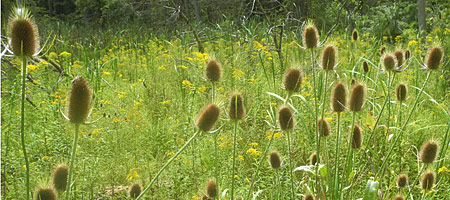Unless you knew where to look, you’d zip right by the patch of weeds. About every other year, I tap the brakes four miles south of Newton on Highway 91. Sometimes, I “get down and stay a spell,” as they say in Baker County. Other times, I just switch off the motor and roll back the mileage—about 55 years.
A chimney stands as a reminder of where my grandparents once lived. Decades ago, fire claimed
their farmhouse. The garden spot by the hard road is now a thicket only fit for a rabbit’s hideout. But from that rectangle of dirt, I picked peas and butterbeans by the bushel. When I think about all the shelling, my thumbs ache. But when I remember the bowls of steaming vegetables on that black-and-white Formica-topped dinette, I smile. My grandmother’s idea of fast food was how fast you could shuck corn and get it in the pot of boiling water, before it lost its sweetness.
Once, I ventured into the weeds, poking a long stick, hoping snakes would strike it and not me. Ten yards into the bramble, I located a set of concrete steps. Standing on the top step, I could see—all the way back to 1952. Not too far in front of me was the spot where I sat on my grandfather’s knee, watching him plat cowhide into a Lash LaRue whip. I could also see the place where I stood on my toes to peer into his casket. In time, I lost the whip, too.
A little farther back, I imagined where the barnyard gate was. The most vivid memory I have of my mother’s father was at that gate, with him honking the horn on his baby-blue F-150 pickup. After several blasts, my grandmother poked her head out the back door.
“What is it, Howell?” she yelled.
“You’ve got to come get this boy, Essie,” he hollered.
“Why?”
“I’ll never get my work done.”
“Why?”
“He asks too many confound questions.”
To the left of the gate were the feed shed and chicken coop. When I thought about the cow’s watering trough, I shivered. My devilish Uncle Billy instructed, “Get the eggs from under that hen.” When the setting hen flew into my face, I stumbled backwards into the trough. I can still feel the cold water dripping off me, and I can hear his guffaws. When he died a half-century later, he was still a boy at heart.
On the farm, what fire didn’t destroy, rot did. The two-story barn collapsed—long ago—in decay. Tossing hay from the loft made a little boy feel like a man, especially when I was sent up the ladder for the first time—by myself. Inside the barn, I witnessed my first birds-and-bees demonstration, courtesy of a Hampshire boar and his harem of sows.
Outside the barn, I was introduced to pit-cooked barbecue. Uncles Billy and Joe dug a hole and shoveled in oak and hickory coals under a hog splayed on field wire. We worked from dark until dawn. Their motto was: “Low and slow.” With a long wooden-handled mop, they let me slather on the basting sauce. I’ve been hooked ever since.
Before descending the crumbling concrete steps, I flashbacked to those 1950s screen-porch summer evenings. I could hear—in between creaks of the swing—whippoorwills cry from the bay across 91. I could smell my grandmother’s strawberry snuff that she spit, just before cackling at her latest yarn.
To the average passerby, it’s just a patch of weeds on the side of the road. But for me, it’s a patch of memories that fire or rot will never destroy.


